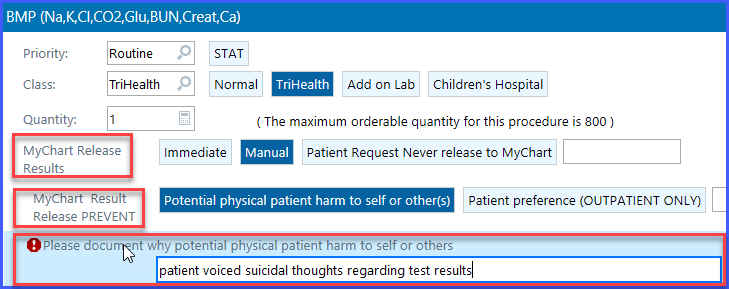
March 24, 2021
Situation: The Information Blocking rules initially published on November 2nd of 2020 have been updated through a series of clarifications to the final Rules and will go live in TriHealth on March 31st. These changes will apply to all clinical disciplines including Nursing and all Allied Health providers, when using the following note types in documentation:
|
Consult Notes |
Discharge Summaries |
|
Imaging Narratives |
Pathology Reports Narratives |
|
History and Physical |
Lab Tests and Results/Values |
|
Lab Report Summaries |
Procedure and Progress Notes |
Background: The 20th Century Cures Act is the result of a longstanding process to increase Patient control of their Health Information. Signed into law last Summer, the rule requires several categories of information to be available electronically (via TriHealth MyChart) for immediate release to patients.
TriHealth planned a 2-step process in order to be compliant with the regulations. Currently, the Inpatient results and notes are released at the time of discharge through MyChart. In the Ambulatory environment and Practices, results and notes are released at the conclusion of a visit unless they are set for an alternative release process by ordering or authorizing provider.
Unless covered by existing statutes, decisions to delay or withhold information requires an assessment of potential physical patient harm or a direct patient request.
Appropriate Reasons for Delaying the Release of Information:
- Physical Harm - When preventing an individual from seeing their own personal health information, a provider needs to have made the determination that disclosing the information could lead to physical harm to the patient. This is not to be used to delay uncomfortable, sensitive, or confusing test results unless there is a concern of physical harm specific to that particular individual. For example, a patient who has previously expressed suicidal thoughts over their deteriorating health.
- Patient Preference - This avenue offers more freedom to clinicians as they can have this discussion with their patients on any given issue. For example, asking a patient their preference prior to receiving the results of a potentially sensitive cancer screening. You may explain the benefits of waiting until you have a chance to review the results and explain them directly to the patient.
**If a note is not shared with a patient the author should include the information blocking SmartPhrase (.informationblocking) in their note and select a reason**


Failure to comply with these rules will place Health Systems and Providers at risk of significant financial penalties or loss of participation in Medicare or other federal programs.
Assessment: Since implementation last November, the process has been working as intended. Providers have made changes in their communications with patients and families, with the understanding of information potentially being received prior to the ability to review or speak with them. Nursing and other Allied Health professionals were also given the option of manually releasing their notes to patients.
Recent clarifications and FAQ’s for the final Information Blocking rules were reviewed by the leadership team and have led to the additional recommendations below that will be implemented on March 31st.
Recommendation: Changes to Inpatient, Ambulatory, Nursing and Allied Health
Changes to Inpatient
- Inpatient results will be released when completed (NEW)
- Inpatient notes will continue to be released at time of discharge
Changes to Ambulatory, Nursing and Allied Health
- Notes will be shared by default (New)
- These disciplines can block their own notes (New)
Example of Note:

Example of Order:

**Changes coming with Epic Upgrade in May**
With the Epic Upgrade coming in May new functionality will be available which will eliminate the need to enter the information blocking SmartPhrase if a qualifying note is not shared. Outpatient providers will be presented with a drop-down menu to choose the reason for not sharing upon signing the visit encounter. This enhancement will save time and clicks.
Overall Rating: